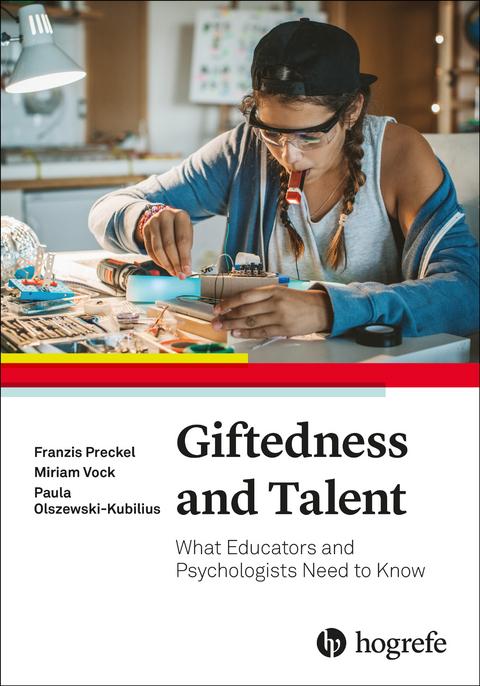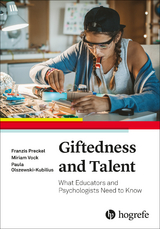Giftedness and Talent
Hogrefe Publishing (Verlag)
978-0-88937-627-4 (ISBN)
* Presents the state-of-art of theory, research, and practice
* Explores the characteristics of gifted students
Understanding and supporting gifted and talented children and adolescents:
What is giftedness? How do talents develop? Are gifted people "different"? How can gifted children be recognized and supported in their development? Based on the authors' many years of expertise in giftedness research and education practice, this book answers these and many other questions about giftedness and talent development in a scientifically sound and at the same time application-oriented way. This new volume offers an up-to-date overview of the theoretical foundations, pioneering studies, and research findings on gifted children
and adolescents, and explores evidence-based options for diagnostics and support. The development of giftedness as well as the characteristics of gifted students, such as performance-related attributes and temperament traits, are also examined. This book is of interest to child psychologists and psychiatrists, educational and school psychologists, educators, and students, and is an ideal textbook for self-study or for those training to become a professional.
Franzis Preckel, PhD, is full Professor of Giftedness Research at the University of Trier. Her research interests encompass psychological assessment, intelligence and giftedness, and factors and processes influencing talent development. Miriam Vock, PhD, is Professor for Empirical Instruction and Intervention Research at the University of Potsdam. Her research interests include intelligence and giftedness, the effectiveness of school-based support measures for gifted students, and empirical educational research. Paula Olszewski-Kubilius, PhD, is the Director of the Center for Talent Development at Northwestern University and a professor in the School of Education and Social Policy. Over the past 39 years, she has created programs for diverse groups of gifted learners and written extensively about talent development.
1 What Is Giftedness?
1.1 Introduction
1.2 Theories and Models of Giftedness and Exceptional
Achievement
1.2.1 Expertise
1.2.2 Models of Giftedness
1.2.3 Performance Definitions Versus Potential
Definitions
1.2.4 Unidimensional Definitions
1.2.5 Multidimensional Definitions and Models
1.2.6 Systems Theory Models
1.2.7 Mega Model
1.2.8 TAD Framework
1.2.9 Conclusions
1.3 The Role of Intelligence in Models of Giftedness
1.3.1 What Is Intelligence?
1.3.2 The Intelligence Quotient
1.4 The Role of Creativity in Models of Giftedness
1.4.1 Creativity: Definition and Models
1.4.2 Creativity as a Systemic and Relational
Phenomenon
1.4.3 Creativity and Intelligence
1.5 Conclusion
2 Pioneering Studies and Methodological
Challenges in Giftedness Research
2.1 Selected Longitudinal Studies on Gifted
Students
2.1.1 Terman Study
2.1.2 Study of Mathematically Precocious Youth
2.1.3 The Marburg Giftedness Project
2.2 Methodological Challenges in Researching
Giftedness
2.2.1 Sample Selection and Groups Not Selected
2.2.2 Using an Appropriate Control or
Comparison Group
2.2.3 Participants' Knowledge of Their Own
Aptitude
2.2.4 Intervention Versus Pure Observation
2.2.5 Different Definitions and Operationalizations
of Giftedness
2.3 Conclusion
3 Characteristics and Development of Gifted
People
3.1 Achievement-Related Characteristics
3.1.1 Relationship Between Intelligence and
Achievement
3.1.2 Studies on the Academic Development of
Gifted Students
3.1.3 Threshold Hypothesis on the Relationship
Between Intelligence and Achievement
3.2 Personality-Related Characteristics
3.2.1 Implicit Theories: Everyday Conceptions
About Gifted People
3.2.2 Socioemotional Adjustment of Gifted
Individuals
3.2.3 Personality Traits
3.2.4 Gender Differences
3.3 Underachievement
3.3.1 Concept
3.3.2 Possible Causes
3.3.3 Progression
3.4 Peculiarities in the Development of Gifted
Children
3.4.1 Asynchronous Development
3.4.2 Special Features of Exceptional Giftedness
3.4.3 Persistent Underchallenge in School
3.4.4 Perfectionism
3.4.5 Increased Sensitivity (Overexcitability)
3.4.6 Fear of Prejudice and Stigmatization
3.5 Family Background of Gifted Individuals
3.5.1 Giftedness as a Stressor for the Family?
3.5.2 Gifted Children From Lower Income
Families and Minoritized Students
3.6 Conclusion
4 Giftedness Identification and Assessment
4.1 Introduction and Overview
4.2 Intelligence Tests in Giftedness Identification
and Assessment
4.2.1 Possibilities and Limitations of Intelligence
Tests in Giftedness Identification and
Assessment
4.2.2 Assessment Strategies for Identification of
Minoritized Students
4.2.3 Description of Intelligence Tests With
Regard to Their Suitability for Use With the
Gifted
4.3 School Achievement Assessment
4.3.1 Gifted Identification
4.3.2 Selection of Suitable Students for Special
Programs
4.3.3 Recognizing Underachievement
4.3.4 School Grades
4.3.5 Standardized School Achievement Tests
4.4 Assessing Underachievement
4.4.1 Statistical Methods for Identifying
Underachievement
4.4.2 Nomination Methods for Identifying
Underachievement
4.5 Assessment of Creativity and Divergent
Thinking
4.6 Nominations and Checklists
4.6.1 Nominations by Teachers
4.6.2 Nominations by Parents
4.6.3 Peer Nomination and Self-Nomination
4.7 Selection Process for a Gifted Class as an
Example of Multimethod and Multimodal
Approach to Identify Giftedness
5 Support in School and Early Childhood
Education
5.1 Introduction
5.2 Support of Gifted Children at School 149
5.2.1 The Four Pillars of School-Based Support
for Gifted Students
5.2.2 Differentiation Within the Classroom
5.2.3 Acceleration
5.2.4 Enrichment
5.2.5 Combination of Acceleration and Enrichment:
Early Entrance Programs
5.2.6 Ability Grouping for Gifted Students in
Special Classes and in School
5.3 Support in Early Childhood and Preprimary
Education
5.3.1 Gifted Children in Early Childhood and
Preprimary Education
5.3.2 Support Opportunities in Early Childhood
Education
5.4 Conclusion
| Erscheinungsdatum | 03.01.2024 |
|---|---|
| Verlagsort | Toronto |
| Sprache | englisch |
| Original-Titel | Hochbegabung |
| Maße | 178 x 254 mm |
| Themenwelt | Geisteswissenschaften ► Psychologie ► Entwicklungspsychologie |
| Geisteswissenschaften ► Psychologie ► Pädagogische Psychologie | |
| Sozialwissenschaften ► Pädagogik ► Sonder-, Heil- und Förderpädagogik | |
| Schlagworte | Assessment • Educational Psychology • Giftedness • Special Needs Education • Talent |
| ISBN-10 | 0-88937-627-1 / 0889376271 |
| ISBN-13 | 978-0-88937-627-4 / 9780889376274 |
| Zustand | Neuware |
| Informationen gemäß Produktsicherheitsverordnung (GPSR) | |
| Haben Sie eine Frage zum Produkt? |
aus dem Bereich




